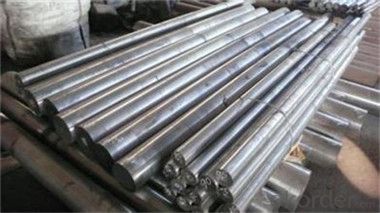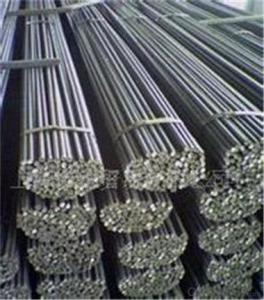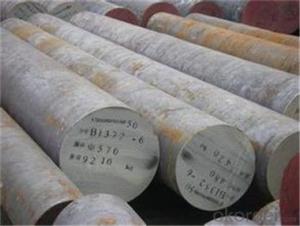HSS Steel Round Bar/High Alloy Round Tool Steel Bar/M2/M25M42/D2/H13
- Loading Port:
- Tianjin
- Payment Terms:
- TT OR LC
- Min Order Qty:
- 33 m.t.
- Supply Capability:
- 2000000 m.t./month
OKorder Service Pledge
OKorder Financial Service
You Might Also Like
Description of steel round bar:
Characteristic:Tungsten-molybdenum high speed steel developed by China,high performance in toughness ,hardness, high temperature hardness.
Festures of steel round bar:
Anneal temperature: 840-860
Relief annealing temperature: 720-760
Hardening temperature: 1210-1230
Hardening medium: salt bath under 600,aslo use oil cooling or air cooling
Normal temper temperation: 540-560 RC Rockwell Hardness after hardening and temperature: 63-66
Production Capacity: 1000 Tons/Month
Tech:EAF+LF+VD+ESR
High strength at elevated temperatures
Specifications of steel round bar:
| C | Si | Mn | W | Mo | Cr | V | P | S |
| 0.80-0.90 | 0.20-0.45 | 0.15-0.40 | 5.50-6.75 | 4.50-5.50 | 3.80-4.40 | 1.75-2.20 | ≤0.030 | ≤0.030 |
Images of steel round bar:

FAQ:
1. What is your package?
Packing situation: standard seaworthy packing or as customer required.
2. How long is the lead time?
Delivery time: 45 days after order confirmed.
3. What payment term do you accept?
Payment: T/T or L/C at sight.
- Q:How can a round steel weld on a flat steel plate be flat and qualified?
- It is required that the current is suitable and the bar is stable. If required, the groove can be turned on the round steel to ensure that the welding is beautiful and qualified
- Q:Can steel round bars be used for making connecting rods?
- Yes, steel round bars can be used for making connecting rods. Steel is a commonly used material for connecting rods due to its high strength and durability, making it suitable for withstanding the stress and load requirements of an engine.
- Q:How do you store excess steel round bars?
- To store excess steel round bars, it is important to follow certain guidelines to ensure their longevity and prevent any damage. Here are a few steps you can take: 1. Properly clean and inspect the steel round bars before storage. Remove any dirt, grease, or moisture from the surface to prevent corrosion. 2. Choose an appropriate storage location. Ideally, it should be a dry, well-ventilated area with stable temperatures. Avoid storing the bars in areas prone to moisture, extreme heat, or direct sunlight. 3. Use racks or pallets to store the bars. Stack them horizontally, one on top of another, with enough space between each layer to prevent deformation or bending. 4. If storing the bars outdoors, cover them with a waterproof tarp or protective coating to shield them from rain, snow, and other elements. 5. Avoid placing excessive weight on top of the bars to prevent deformation. Be mindful of any sharp objects or edges nearby that could cause damage. 6. Regularly inspect the stored bars to ensure no signs of corrosion, rust, or other damage. If any issues are detected, take the necessary steps to address them promptly. Remember, proper storage is crucial to preserve the quality and integrity of the steel round bars. By following these guidelines, you can ensure that your excess steel round bars remain in good condition until they are needed for future use.
- Q:What are the advantages of using silicon-alloy steel round bars?
- There are several advantages to using silicon-alloy steel round bars. Firstly, silicon-alloy steel has excellent strength and durability. It is known for its high tensile strength, which makes it suitable for applications that require heavy-duty performance. This strength also allows it to withstand heavy loads and resist deformation, making it a reliable choice for various mechanical and structural purposes. Secondly, silicon-alloy steel round bars have good heat resistance. The presence of silicon in the alloy improves its ability to handle high temperatures without losing its structural integrity. This makes it ideal for applications that involve exposure to extreme heat, such as in furnace components, exhaust systems, or high-temperature equipment. Additionally, silicon-alloy steel round bars offer excellent corrosion resistance. The alloying elements in silicon-alloy steel, such as chromium and nickel, help create a protective oxide layer on the surface, preventing the metal from corroding and prolonging its lifespan. This makes it suitable for use in marine environments or corrosive atmospheres. Furthermore, silicon-alloy steel round bars have good machinability and weldability. This means that they can be easily formed into various shapes and sizes, making them versatile for different manufacturing processes. The ability to weld silicon-alloy steel allows for easy fabrication and customization, making it a convenient choice for many industries. Lastly, silicon-alloy steel round bars are cost-effective. Compared to other high-performance alloys, silicon-alloy steel is relatively more affordable, making it a cost-effective option for applications that require strength, durability, and resistance to heat and corrosion. In conclusion, the advantages of using silicon-alloy steel round bars include excellent strength and durability, good heat resistance, corrosion resistance, machinability, weldability, and cost-effectiveness. These qualities make silicon-alloy steel a versatile and reliable material for various industrial applications.
- Q:How do steel round bars perform in high-temperature environments?
- Steel round bars generally perform well in high-temperature environments due to their high heat resistance and thermal stability. The composition and manufacturing process of steel bars allow them to retain their mechanical properties, such as strength and hardness, even at elevated temperatures. However, the specific performance of steel round bars in high-temperature environments can vary depending on factors like the grade of steel, duration of exposure, and the presence of corrosive agents.
- Q:What are the different surface defects that can be found in steel round bars?
- Some common surface defects that can be found in steel round bars include scratches, pits, cracks, scale, and decarburization.
- Q:Can steel round bars be used for making camshafts?
- Yes, steel round bars can be used for making camshafts. Steel is a common material used for camshaft production due to its high strength, durability, and resistance to wear and fatigue. Steel round bars can be machined and shaped into the desired profile, making them suitable for manufacturing camshafts that are critical components in internal combustion engines. The specific type of steel used will depend on the application and performance requirements, but commonly used steels include alloy steels or carbon steels with high mechanical properties. Overall, steel round bars offer a reliable and cost-effective option for producing camshafts that can withstand the demanding conditions of engine operation.
- Q:How are steel round bars used in the automotive industry?
- Steel round bars are commonly used in the automotive industry for various applications such as manufacturing of axles, drive shafts, suspension components, and steering systems. These bars provide high strength and durability, allowing them to withstand the heavy loads and harsh operating conditions of vehicles. Additionally, steel round bars can be machined and formed into desired shapes, making them versatile and suitable for different automotive parts.
- Q:What is the average cost of steel round bars?
- The cost of steel round bars can change depending on several factors, including size, grade, and market conditions. Normally, steel round bars are priced between $0.50 and $5 per pound. Nevertheless, it is worth mentioning that these prices are only estimates and can vary depending on the specific needs and location of the purchase. Moreover, it is essential to consider additional expenses like transportation, processing, and applicable taxes to determine the total cost. To obtain the most accurate and current information on the average cost of steel round bars in your region, it is advisable to consult local suppliers or conduct market research.
- Q:What is the difference between a turned and a ground steel round bar?
- A turned steel round bar and a ground steel round bar are two different types of steel bars that have undergone different manufacturing processes. A turned steel round bar is created by rotating a cylindrical steel rod against a cutting tool, which removes material from the surface of the bar to achieve the desired dimensions and finish. This process helps to improve the dimensional accuracy and smoothness of the bar's surface. Turned steel round bars are commonly used in applications that require tight tolerances and a smooth surface finish, such as in precision machining or automotive components. On the other hand, a ground steel round bar is manufactured by passing a turned steel round bar through a grinding machine. This machine uses an abrasive wheel to remove any surface imperfections or irregularities from the bar. The grinding process ensures that the bar has a consistent diameter and a smooth, polished surface. Ground steel round bars are often used in applications that require a high level of precision and surface finish, such as in aerospace components or hydraulic cylinders. In summary, the main difference between a turned and a ground steel round bar lies in the manufacturing processes they undergo. While turned bars are created by cutting material from the surface, ground bars are refined by grinding to achieve superior dimensional accuracy and surface smoothness. The choice between turned and ground steel round bars depends on the specific requirements of the application and the level of precision and surface finish needed.
1. Manufacturer Overview |
|
|---|---|
| Location | |
| Year Established | |
| Annual Output Value | |
| Main Markets | |
| Company Certifications | |
2. Manufacturer Certificates |
|
|---|---|
| a) Certification Name | |
| Range | |
| Reference | |
| Validity Period | |
3. Manufacturer Capability |
|
|---|---|
| a)Trade Capacity | |
| Nearest Port | |
| Export Percentage | |
| No.of Employees in Trade Department | |
| Language Spoken: | |
| b)Factory Information | |
| Factory Size: | |
| No. of Production Lines | |
| Contract Manufacturing | |
| Product Price Range | |
Send your message to us
HSS Steel Round Bar/High Alloy Round Tool Steel Bar/M2/M25M42/D2/H13
- Loading Port:
- Tianjin
- Payment Terms:
- TT OR LC
- Min Order Qty:
- 33 m.t.
- Supply Capability:
- 2000000 m.t./month
OKorder Service Pledge
OKorder Financial Service
Similar products
New products
Hot products
Related keywords































